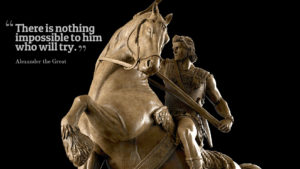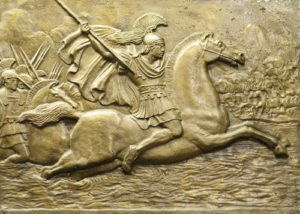Alexander and Bucephalus
http://www.baltana.com/tag/alexander-the-great-quotes.html (Alexander The Great Quotes Wallpapers HD Backgrounds, Images, Pics, Photos Free Download)
All horse lovers know the horse Bucephalus, if not from history, certainly from the books and movie The Black Stallion. Bucephalus was the famous and well-loved horse of Alexander the Great. It fires one’s imagination to read Plutarch’s story of how twelve-year-old Alexander won the horse’s devotion … A horse dealer offered the horse to Alexander’s father, Philip II of Macedonia, his breeding was that of the “best Thessalian strain.” He asked the enormous sum of thirteen talents (approximately $182,000 in 2017 dollars). Since no one had been able to tame the animal, Philip wasn’t interested, but Alexander immediately loved the horse and promised to pay the amount to his father should he fail to tame it. Alexander was allowed to try and surprised everyone by subduing and taming the fiery black stallion.
How Alexander Tamed Bucephalus
Alexander noticed how the horse was distressed upon seeing his own shadow so he calmed the animal and turned him towards the sun so the horse didn’t have to view its shadow. With the horse now able to be trained, Alexander won the wager and named his prize horse Bucephalus. He loved the animal so much that when the horse died, in 326 B.C., Alexander named a city after the horse: Bucephala.
Extract on Bucephalus
“King Alexander had also a very remarkable horse; it was called Bucephalus, either on account of the fierceness of its aspect, or because it had the figure of a bull’s head marked on its shoulder. It is said, that he was struck with its beauty when he was only a boy, and that it was purchased from the stud of Philonicus, the Pharsalian, for thirteen talents. When it was equipped with the royal trappings, it would suffer no one except Alexander to mount it, although at other times it would allow anyone to do so. A memorable circumstance connected with it in battle is recorded of this horse; it is said that when it was wounded in the attack upon Thebes, it would not allow Alexander to mount any other horse. Many other circumstances, also, of a similar nature, occurred respecting it; so that when it died, the king duly performed its obsequies, and built around its tomb a city, which he named after it.” The Natural History of Pliny, Volume 2, by Pliny (the Elder.), John Bostock, Henry Thomas Riley.
From Wikipedia, the free encyclopedia – https://en.wikipedia.org/wiki/Bucephalus
Ancient accounts state that Bucephalus died after the Battle of the Hydaspes in 326 BC, in what is now modern Punjab Province of Pakistan, and is buried in Jalalpur Sharif outside Jhelum, Punjab, Pakistan. Another account states that Bucephalus is buried in Phalia, a town in Pakistan’s Mandi Bahauddin District in Punjab Province, which is named after him (Alexandria Bucephalous). Bucephalus was named after a branding mark depicting an ox’s head on his haunch.
Alexander and Bucephalus
The Alexander story presents a mythic variant of Bucephalus’s origin. In this tale, the colt, whose heroic attributes surpassed even those of Pegasus, is bred and presented to Philip on his own estates. The mythic attributes of the animal are further reinforced in the romance by the Delphic Oracle who tells Philip that the destined king of the world will be the one who rides Bucephalus, a horse with the mark of the ox’s head on his haunch.
Arrian states, with Onesicritus as his source, that Bucephalus died at the age of thirty. Other sources, however, give as the cause of death not old age or weariness, but fatal injuries at the Battle of the Hydaspes (June 326 BC), in which Alexander’s army defeated King Porus. Alexander promptly founded a city, Bucephala, in honour of his horse. It lay on the west bank of the Hydaspes river (modern-day Jhelum in Pakistan). The modern-day town of Jalalpur Sharif, outside Jhelum, is said to be where Bucephalus is buried.
The legend of Bucephalus grew in association with that of Alexander the pair forged a sort of cult in that, after them, it was all but expected of a conqueror that he had a favourite horse. Julius Caesar had one; so too did the eccentric Roman Emperor Caligula, who made a great fuss of his horse Incitatus, holding birthday parties for him, riding him while adorned with Alexander’s breastplate, and planning to make him a consul.
The value which Alexander placed on Bucephalus emulated his hero and supposed ancestor Achilles, who claimed that his horses were “known to excel all others—for they are immortal. Poseidon gave them to my father Peleus, who in his turn gave them to me.”
All of us who have something to do with horses often have a horse that connects deep within your soul. If you have a little time, I would love to hear about your favourite horse.


2 Responses
Jeanette Poede
That was a great read. Thank you for sharing. ?
Carmel
Thrilled you enjoyed the blog Jeanette. It was really interesting to read about and share this famous story.
Thanks again, Carmel